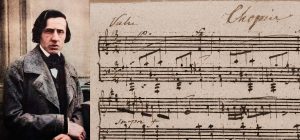Piano Forum
 |
New Piano Piece by Chopin Discovered – Free Piano Score A previously unknown manuscript by Frédéric Chopin has been discovered at New York’s Morgan Library and Museum. The handwritten score is titled “Valse” and consists of 24 bars of music in the key of A minor and is considered a major discovery in the wold of classical piano music. Read more >> |
Pages: [1] Go Down
Pages: [1] Go Up
For more information about this topic, click search below!
 Topic: Chopin, Prelude, Op. 28, No. 1 in C
Topic: Chopin, Prelude, Op. 28, No. 1 in C